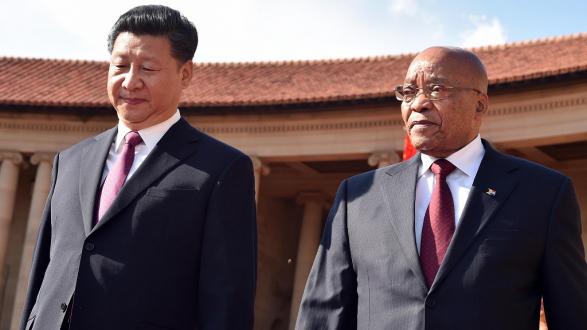It is old news that China has aggressive commercial ambitions in Africa, but fresh numbers reveal the depth of China’s success—and raise the stakes for U.S. dithering.
A recent Ernst & Young report shows that China more than doubled its foreign direct investment (FDI) projects in Africa in 2016, and that the value of these projects outweighs U.S. investments by a factor of 10. Moreover, China’s Commerce Ministry recently announced that China-Africa trade increased by 16.8% year-on-year in the first quarter of 2017. As if that was not enough, various African leaders were courted at a summit in Beijing last month, which promised extensive deals in infrastructure and trade under China’s "One Belt, One Road" initiative.
All of this serves as an exclamation mark on the following sentence: The United States must step up its game on U.S.-Africa trade and investment.
Unfortunately, the United States has been slow to stake out a serious commercial strategy toward Africa, and U.S. companies by and large continue to overestimate the risks of doing business in the region. In contrast, China has sustained a policy of deliberate engagement and investment on the continent—and is making enviable returns in the process. Across Africa, China’s infrastructure projects generate earnings worth around $50 billion a year, which directly and indirectly translate into numerous jobs for Chinese citizens.
Building on a strong legacy of bipartisanship regarding U.S.-Africa policy, the Obama administration deepened commercial ties on the continent, including through initiatives like Power Africa (designed to double electricity access in the region) that garnered broad Republican support. Indeed, U.S. FDI in Africa surged by over 70% from 2008 to 2015, on a historic-cost basis. Yet, in absolute terms, much more remains to be done to fully capitalize on Africa’s potential to contribute to U.S. growth.
Worryingly, the Trump administration is so far heading in exactly the wrong direction. The policy signal to increase U.S. investment in Africa is no more. Whereas President Obama called for stronger U.S.-Africa economic ties—as did key Cabinet-level champions—the Trump administration has shown no senior-level interest in this agenda. The raft of vacant positions across key federal departments compounds the problem.
As the U.S. economy looks for new global growth to fuel domestic jobs, Africa represents a critical commercial frontier.
Worse, President Trump is actively trying to eviscerate some of the vital tools needed to promote a serious commercial agenda. Though the "budget wars" are ongoing, fortunately Congress has so far rejected President Trump’s proposals to eliminate funding for the U.S. Overseas Private Investment Corporation (OPIC) and U.S. Trade and Development Agency (USTDA). Both are important for trade and investment globally, and in Africa in particular. Between 2009 and 2016, OPIC’s commitment of about $7 billion in financing and insurance to secure projects in Africa catalyzed an additional $14 billion in investments in the region. Over that same time period, USTDA more than doubled its Africa portfolio of grants and technical assistance for infrastructure projects, boosting U.S. exports by at least $2.5 billion.
These and other tools should be strengthened—not demolished—to support U.S. businesses in Africa and to successfully compete with China. This includes the U.S. Export-Import bank, which has been outpaced by the China Export-Import Bank (some estimates say by a factor of 37 for loans to Africa) despite having a Congressional mandate to prioritize helping U.S. exporters compete for business in Africa.
The Trump administration still has the opportunity to advance a serious commercial agenda in Africa, but we are reaching an inflection point, beyond which it will be increasingly difficult to make up for lost ground. As a dynamic continent of over one billion people (who will comprise one quarter of the world’s population and workforce by 2050), Africa’s role in the global economy will certainly increase over time. As the U.S. economy looks for new global growth to fuel domestic jobs, Africa represents a critical commercial frontier. Seizing this opportunity, however, depends on the interest and capacity of American companies to do business in Africa.
There is still time to change course but, failing that, middling policy and weakened tools to promote U.S. investment in Africa essentially constitute a "China First" policy.
___________________________
Grant T. Harris is a Pacific Council member and the CEO of Harris Africa Partners LLC. Previously he was the principal advisor to President Obama on issues related to Africa, serving as senior director for African Affairs at the White House from 2011 to 2015.
A version of this article was originally published in Forbes.
The views and opinions expressed here are those of the author and do not necessarily reflect the official policy or position of the Pacific Council.




